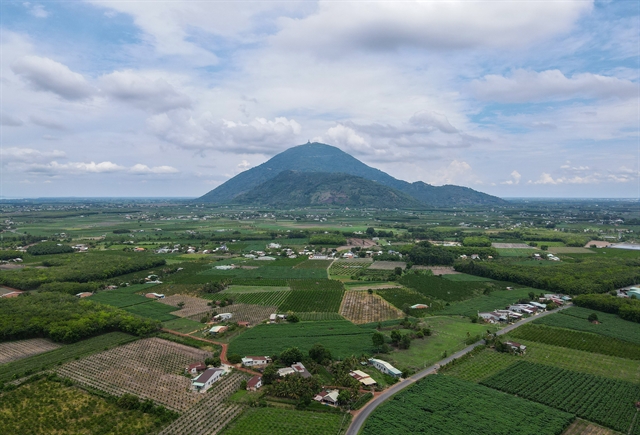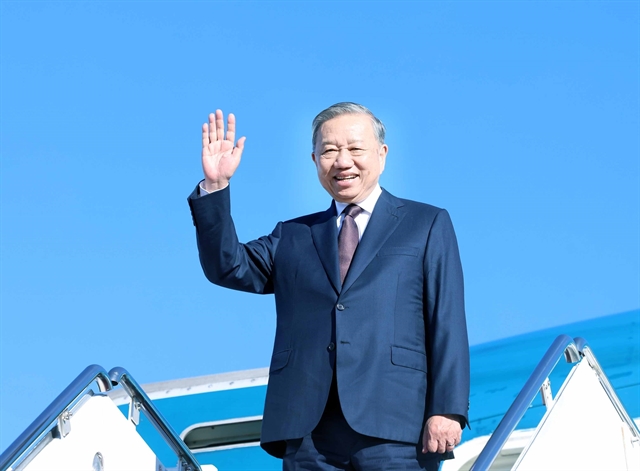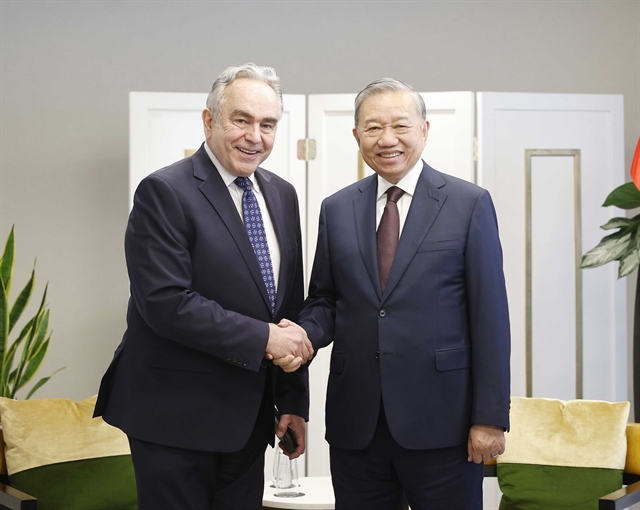 Op-Ed
Op-Ed
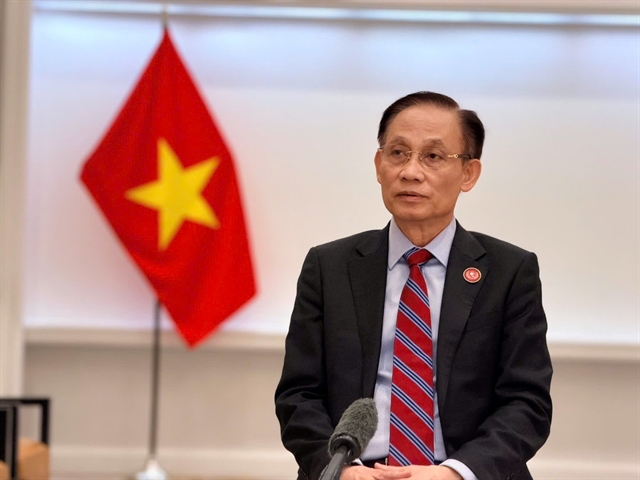
Trọng Kiên
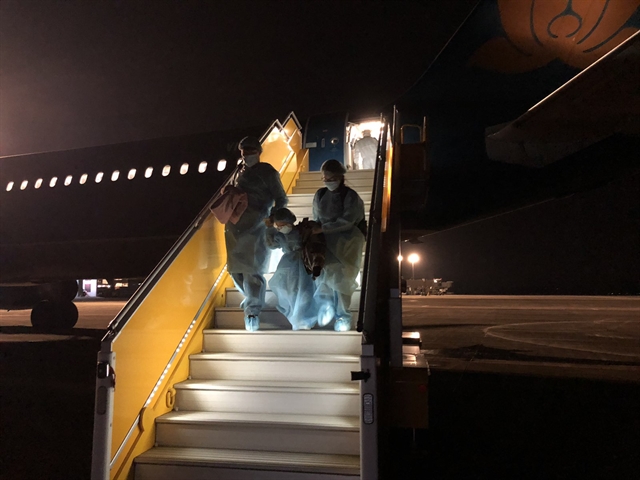 |
| Vietnamese citizens repatriated from Wuhan arrived in Vân Đồn International Airport, Quảng Ninh Province, Việt Nam on the last 'rescue' flight from the novel coronavirus epicentre in early February 2020. — Photo from Vietnam Airlines |
It was early February 2020, when the novel coronavirus began to be a huge concern. Flight crews in full protective suits from Việt Nam were tasked with the ‘mission’ of bringing back Vietnamese citizens stranded in the virus epicentre Hubei, Wuhan, in China.
The ‘rescue’ flight, as it had become to be known, was a rousing event, inspiring the faith that no one will be left behind in these tumultuous times.
It is too bad, that over the course of Việt Nam’s border closure, the once-humanitarian policy has been tainted by greed beyond recognition when it became a full-on service, and quickly a source of resentment – instead of pride or thankfulness – for those ‘lucky’ enough to board those repatriation flights.
Genesis
Corruption in times of crisis is a tale as old as time, when oversight is too little and too late.
Through most of 2020, the very few flights that could enter Việt Nam were specially arranged by the Government, where citizens – mostly students, workers whose stays overseas have ended, people with disabilities, or the elderly – would need to pay only the flight ticket, and not the fees for their quarantine in military-run facilities.
But the capacity was very limited, while the demand from Vietnamese overseas was huge and many were willing to pay for quarantine stays at other civilian facilities – in hotels and resorts that afford more comfort. In around November 2020, the ‘combo’ repatriation flights came into existence alongside the ‘rescue’ ones, with the passengers bearing the entire costs of ticket and quarantine.
It looked to be straightforward so far, simply a matter of supply and demand, until a number of people with vested interests – at the Government Office, the Ministry of Foreign Affairs, the Ministry of Health and the Ministry of Transport, along with several travel agencies – saw that there was money to be made from this policy.
The many travel agencies, who were struggling because of severe disruptions in tourism activities both domestic and international, desperately wanted to get a piece of this bonanza.
The officials in charge of approving the flight and quarantine facility plans were more than pleased to find they could give favours just to those companies who were willing to shell out some under-the-table cash, and just make it difficult for those who played it clean until they either went along or gave up.
The procedures to get those flights up and running were of course tedious and involved multiple ‘gates’.
The travel companies would need to get approval from the Government Office and the working group of five ministries, and the consent for quarantine from the people’s committees of the quarantine locations, while still needing to deposit for aircraft and hotel stays, meaning that if just one approval is missing the entire thing just collapsed – hence the need for greasing the palms.
This money of course would be taken from the artificially inflated prices that the passengers were charged.
In the two years when all of this went on, only rumblings of exorbitant prices and opaque procedures surfaced but hardly any action was taken, until the investigation authorities announced the first charges and made it officially a ‘case’ in late January 2022, a month and a half before the country completely reopened its borders.
More than a year afterwards, the indictment was issued, accusing 21 officials – including those as senior as the former deputy foreign minister, assistant to the health minister, several from the consular department, along with former assistant to the Deputy Prime Minister – of abusing their power to receive bribes worth over VNĐ164.8 billion (US$7 million) which caused damages of about VNĐ10 billion.
Eighteen faced sentences of up to 20 years in prison, a life sentence, and the death penalty – quite a rare phenomenon that underpins how seriously the judicial branch takes this case, to the high approval of the public.
Four others – former ambassador and officials to the Vietnamese embassy in Malaysia – were charged with abusing power in the discharge of official duties. Twenty-three people – mostly directors of travel companies – were charged with giving bribes worth VNĐ226.7 billion, while four other individuals acted as intermediaries and gave bribes worth VNĐ74.4 billion, and embezzled VNĐ24.5 billion.
The Ministry of Public Security has also released salacious details of the secret dealings and the sprawling conspiracy between individuals and organisations – both private and public – involved in this massive scheme.
How the wife of the deputy foreign minister met with travel companies in cafés to receive the bribes, how the assistants to senior leaders were granted carte blanche to give approval for the flights and eventually exploited that power, how officials at the immigration department under the public security ministry colluded to ‘negotiate’ the bribes to buy their approvals, and how even the police officers investigating the case eventually got dirty attempting to save guilty ones from harsher sentences.
What now
It’s easy to tell that people were not exactly pleased learning of this sordid affair.
Now with all these defendants awaiting trial – formerly respected members of society – for their crimes, there are an array of questions that need answers – especially in the redress of the consequences, if at all possible.
Can all the passengers, who have had to ‘grit their teeth’ and pay for the exorbitant prices of the tickets and the quarantine stays, file for compensation? How much is the ‘real’ price of these services that the ‘chosen’ passengers had to shell out for – technically they were ‘willing’ to pay off their own volition, but with all things considered, could they be not merely paying customers but victims that were forced to shell out hard-earned money in times of desperation, with no other choices at all when the border is sealed shut?
Public buy-in is not something, well, easy to buy. Vietnamese people’s trust in the Government’s COVID-19 response drew international recognition and was behind the successes of the virus fight, but the damage to this faith dealt by the two disgraceful scandals is significant and must be taken into account.
What if another pandemic broke out – more likely and probably sooner than we might expect – can lockdowns and border closures, or any similar measure ranging from mere inconveniences to livelihood-destructive – fly with members of the public as well as last time? Or to expand on this, can we still expect compliance and understanding in times of crises, or the authorities will have to put out two fires at once – with another one the fire of discontent and protest, which means a prolonged crisis?
Party General Secretary Nguyễn Phú Trọng, who has on multiple occasions pleaded that corruption is an existential threat to the Party, has also set out these memorable slogans for the ‘blazing furnace’ anti-graft campaign – aiming towards a place where civil servants “cannot be corrupt,” “do not dare to be corrupt,” “do not need to be corrupt,” and “do not want to be corrupt.”
It's basically a multi-pronged approach – a fool-proof institutional framework at both Party and State levels, worthwhile, attractive remunerations, and strong corruption surveillance, detection, and handling mechanisms – to make corruption impossible, or at least discourage it from happening in the first place. A prevention is better than cure sort of approach that mirrors Việt Nam’s stringent zero COVID policy prior to widespread vaccinations.
Of course, it’s hard to really gauge what could have been discouraged from happening thanks to the efforts, but from the scale of the graft – measuring in kilos of golds and cases of dollars – and the audacity of the officials that still pop up in recent years, we’re still too long away from achieving that vision.
Specifically in this case, when the public-private partnership namely for the sake of public interests was taken advantage of to line the pockets of a few, how to prevent such occurrences in the future so that the public sector and private sector can harmonise their forces for the greater good?
The answers are all there really – transparency, stronger oversight, even protection and belief of the potential victims/whistleblowers – but the implementation has always been a weak point – not just in Việt Nam – and in the times of chaos caused by the plague, it becomes even more shaky.
Still it has to be done – safeguards against opportunism and long-term investments in accountability and inspection institutions are critical, especially when the credibility of the Party and the State is at stake. — VNS

